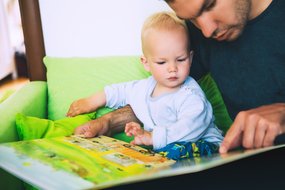
The home learning environment (HLE) has a profound impact on children’s early learning and development and their outcomes in later life.
We asked parents of early years children aged from birth to 5 how often they were taking part in key learning activities with their child, including: reading, chatting, playing, singing, painting and drawing, playing outside, engaging in digital learning activities, visiting the library and group activities that support language development.
Findings from our survey in summer 2024 were compared with results from surveys conducted in 2019, 2020 and 2021.
Key findings from our research
In 2024, fewer parents reported engaging daily in all home learning activities compared with 2019. For example:
- 4 in 5 (78.1%) of parents said they had chatted to their child at least once a day in the last week, a decrease of 12.2 percentage points(pp) compared with 2019, when 9 in 10 (90.3%) said they had done this
- 1 in 2 (56.0%) parents told us that they had played together with their child at least once a day in the last week. This compares with 3 in 4 (76.2%) who reported playing with their child daily in 2019, a decrease of 20.2pp
- 1 in 2 (50.5%) parents said they had read with their child daily in 2024, a decrease of 15.1pp compared with 2019, when 2 in 3 (66.1%) said they had done this.
- Around 1 in 2 parents reported singing with their child (47.5%) daily or more often, while 1 in 3 engaged their children with digital learning activities (34.5%) and played outdoors (33.3%) daily.
- We also asked about access to resources. Most parents reported there being children’s books, whether owned or borrowed, at home. However, almost 1 in 4 (22.5%) parents said there were fewer than 10 children’s books at home
- 3 in 4 (74.3%) parents said they had visited the library as a family at least once in the last month, demonstrating the importance of this resource for families with young children. However, 1 in 5 (19.5%) said they had not been to the library with their child at all during this time.
The Covid-19 pandemic, the cost-of-living crisis and cuts to funding for early years services are likely to have played a significant role in the decline in engagement with home learning activities. Given the impact of the home learning environment on improving outcomes for children, these findings call for urgent and considered action.
What are we doing about it?
Our Early Words Matter campaign is working to support 250,000 pre-school children, with a focus on those growing up in areas of financial disadvantage, to support early years educators and families with events, activities and resources designed to support shared parent-child engagement inside and outside the home. However, more must be done to explore the factors affecting parental engagement with activities.